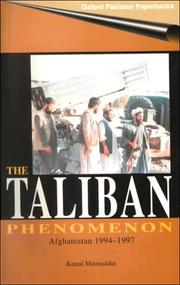| Listing 1 - 10 of 30 | << page >> |
Sort by
|
Book
ISBN: 9780615325699 Year: 2009 Publisher: New York : Permanent Mission of Afghanistan to the United Nations,
Abstract | Keywords | Export | Availability | Bookmark
 Loading...
Loading...Choose an application
- Reference Manager
- EndNote
- RefWorks (Direct export to RefWorks)
Book
Year: 1980 Publisher: Washington : US International Communication Agency,
Abstract | Keywords | Export | Availability | Bookmark
 Loading...
Loading...Choose an application
- Reference Manager
- EndNote
- RefWorks (Direct export to RefWorks)
Book
ISBN: 9781849048347 Year: 2017 Publisher: London : Hurst,
Abstract | Keywords | Export | Availability | Bookmark
 Loading...
Loading...Choose an application
- Reference Manager
- EndNote
- RefWorks (Direct export to RefWorks)
The archetype of 'my enemy's enemy is my friend', India's political and economic presence in Afghanistan is often viewed as a Machiavellian ploy aimed against Pakistan. The first of its kind, this book interrogates that simplistic yet powerful geopolitical narrative and asks what truly drives Indian's Afghanistan policy. Based on an extensive repertoire of hitherto untapped primary sources including official memoranda, diplomatic correspondence, and a series of interviews with key political actors, this book provides a comprehensive analysis of India's strategy debates and foreign policymaking processes vis-a-vis Afghanistan, from the last decade of the Cold War to the 1990s Afghan civil war and the more recent US-led war on terror. It demonstrates that Indian presence in Afghanistan has been guided primarily by an enduring vision for the region that requires a stable balance of power across the Durand Line. The author offers a nuanced understanding of India's strategic intent and actions, which is critical to resolving the seemingly unending war in Afghanistan, as well as wider bilateral disputes between the two South Asian rivals.
Book
ISBN: 9781498546546 Year: 2017 Publisher: Lanham, MD : Lexington Books,
Abstract | Keywords | Export | Availability | Bookmark
 Loading...
Loading...Choose an application
- Reference Manager
- EndNote
- RefWorks (Direct export to RefWorks)
Central Asia is a relatively understudied neighbor of Afghanistan. The region is often placed into a number of historical and political contexts - a section of the Silk Road, a pawn in the 'Great Game', the 'spillover' state that exemplifies the failure of US foreign policy - that limit scholarly understanding. This edited volume contributes by providing a broad, long-term analysis of the Central Asia-Afghanistan relationship over the last several decades. It addresses the legacy of Soviet intervention with a unique first-hand selection of interviews of former Soviet Central Asian soldiers that fought in the Soviet-Afghan War. It examines Afghanistan's northern neighbors, discussing Russia, Uzbekistan, Tajikistan, and Turkmenistan - their strategy for Afghanistan, their perception of challenges and opportunities of the country, and patterns of cooperation and conflict. The collection also looks at recent US strategic initiatives in the region, in particular the New Silk Road Initiative that envisions a growing Central Asia-South Asia connection.
Book
ISBN: 9781442261990 Year: 2016
Abstract | Keywords | Export | Availability | Bookmark
 Loading...
Loading...Choose an application
- Reference Manager
- EndNote
- RefWorks (Direct export to RefWorks)
This book calls for rethinking U.S. policy toward promoting Afghanistan as a regional economic hub in Southwest and Central Asia as it fits within the broader national security interest of the regional states. It argues for defining Afghanistan within the U.S. national security interests in Southwest and Central Asia, including Iran, and offers critical strategic tools for Washington to support political openness and reforms that can balance China and Russia, as well as more effectively manage Iran's regional behavior. It links the U.S. policy approach in Southwest and Central Asia as the 'missing leg' of Washington's East Asia policy. This book defines the strategic interests of each of Afghanistan's neighboring states and key regional actors to explain why a rethinking of the U.S. role in Afghanistan can assist the emergence of a new regional order in Southwest and Central Asia, which in turn can embolden a free market economy and a growing political openness superior to authoritarianism and Islamist militancy.

ISBN: 0195792742 Year: 2000 Publisher: Oxford, UK : Oxford University Press,
Abstract | Keywords | Export | Availability | Bookmark
 Loading...
Loading...Choose an application
- Reference Manager
- EndNote
- RefWorks (Direct export to RefWorks)
Book
ISBN: 0895490870 Year: 1988 Publisher: Cambridge, MA : Institute for Foreign Policy,
Abstract | Keywords | Export | Availability | Bookmark
 Loading...
Loading...Choose an application
- Reference Manager
- EndNote
- RefWorks (Direct export to RefWorks)
Book
ISBN: 9781553393535 Year: 2012 Publisher: Kingston, CAN : Queen's University,
Abstract | Keywords | Export | Availability | Bookmark
 Loading...
Loading...Choose an application
- Reference Manager
- EndNote
- RefWorks (Direct export to RefWorks)
Book
ISBN: 9781849040723 Year: 2010 Publisher: London Hurst
Abstract | Keywords | Export | Availability | Bookmark
 Loading...
Loading...Choose an application
- Reference Manager
- EndNote
- RefWorks (Direct export to RefWorks)
Book
ISBN: 9782213654966 Year: 2011 Publisher: Paris : Fayard,
Abstract | Keywords | Export | Availability | Bookmark
 Loading...
Loading...Choose an application
- Reference Manager
- EndNote
- RefWorks (Direct export to RefWorks)
| Listing 1 - 10 of 30 | << page >> |
Sort by
|

 Search
Search Feedback
Feedback About UniCat
About UniCat  Help
Help News
News